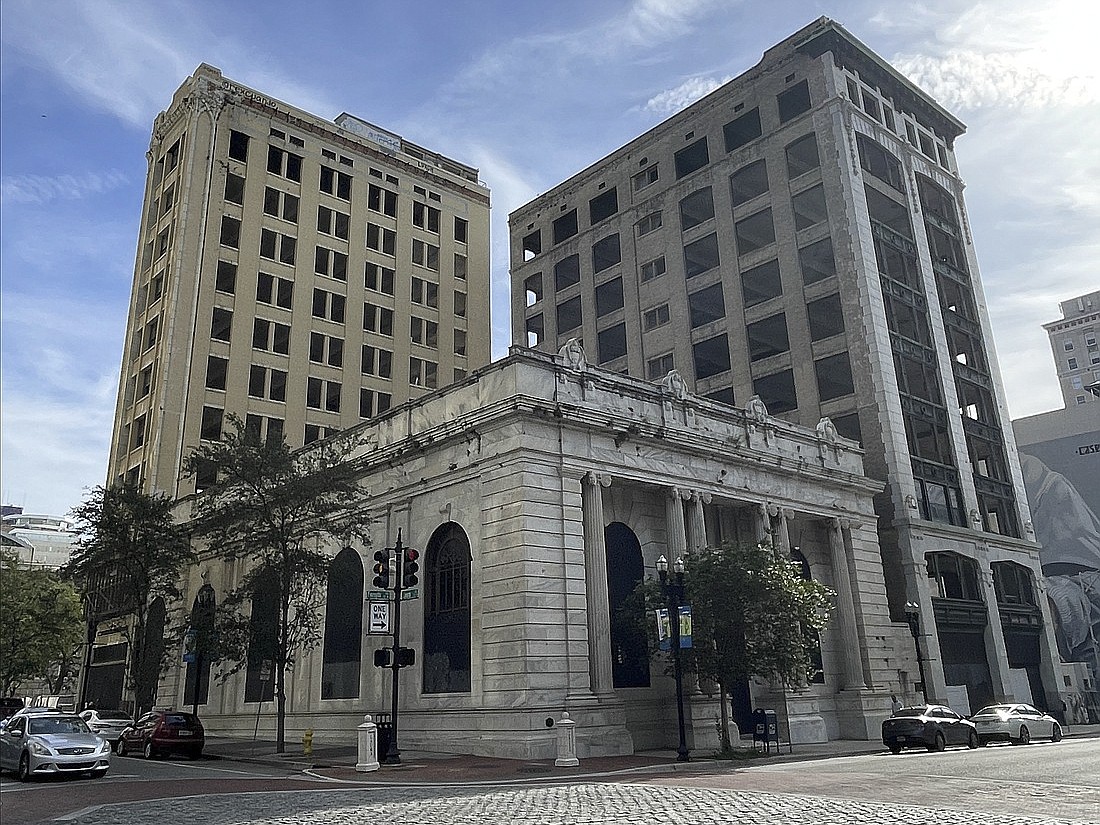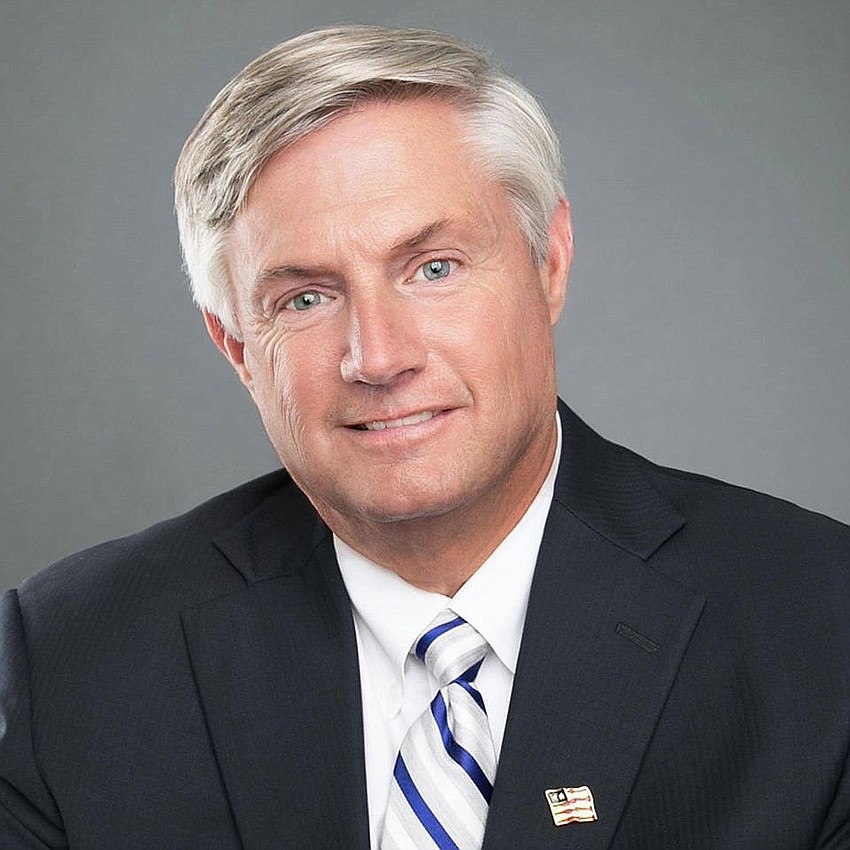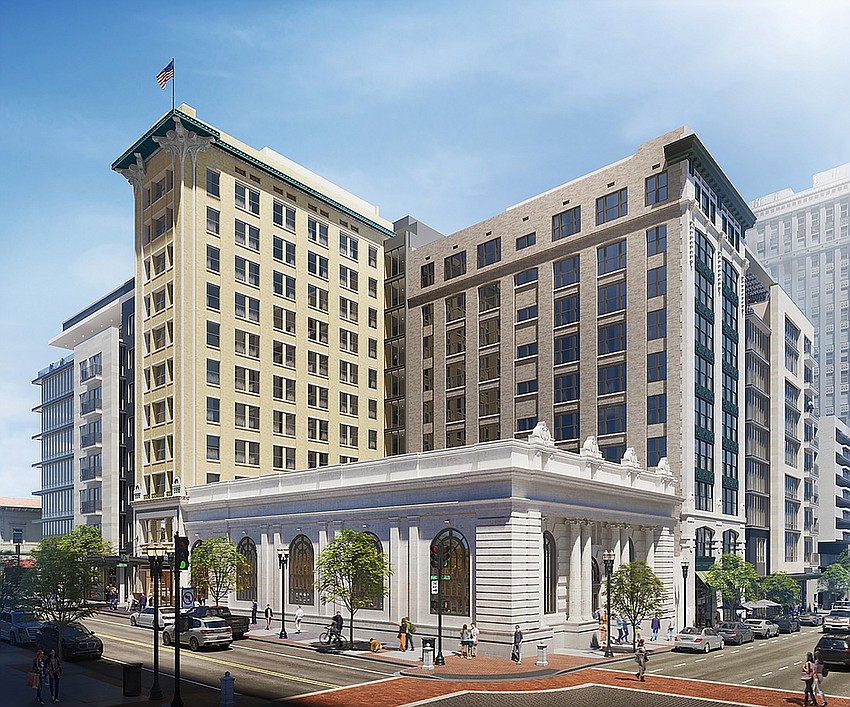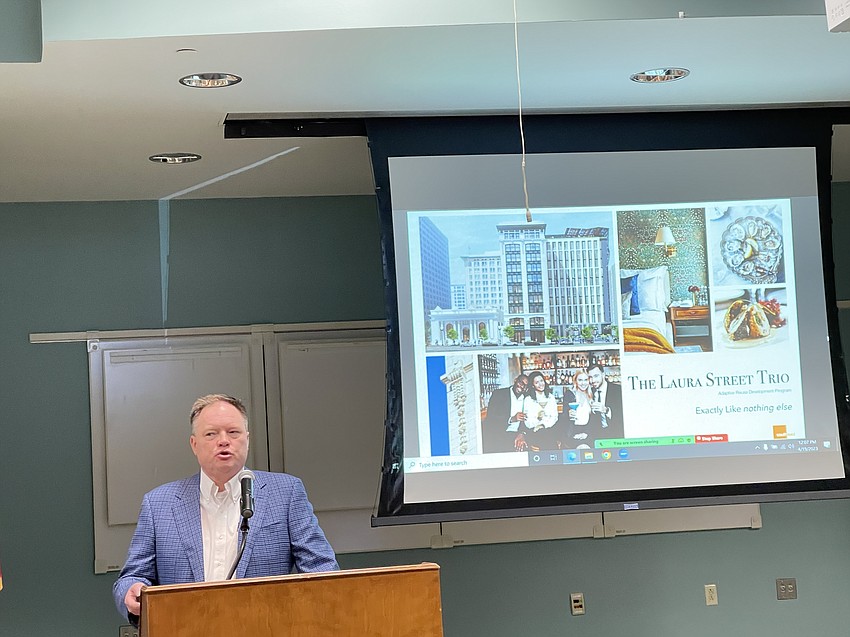
After hearing concerns that the latest deal to redevelop the historic Laura Street Trio of buildings in Downtown Jacksonville could expose the city to hundreds of millions of dollars in debt liability and trigger a downgrading of the city’s credit rating, the Jacksonville City Council voted Jan. 4 to send an incentives package for the project back to the Downtown Investment Authority for further development and vetting.
The vote came during what was scheduled to be the first of two full-Council meetings aimed at fast-tracking the incentives, sought by SouthEast Development Group to fuel a $175.1 million project to transform the historic buildings into a hotel, apartments and restaurant.

Instead, the lead sponsor of an ordinance containing the incentives, Council member Matt Carlucci, withdrew the legislation from emergency consideration, and Council President Ron Salem canceled the second of the two hearings.
As outlined in the bill, Ordinance 2023-876, the city’s incentives include $36.5 million in forgivable loans and property tax breaks, a $2 million forgivable loan and a $22 million “city participation loan” designed to guarantee a 25-year construction loan obtained by Atkins from Capital One Public Funding.
The city funding would be placed in a reserve and used as a backstop – it would only be paid out if Atkins defaulted on the construction loan.
In return, the city would earn 12% of net cash flows from the completed property for as many as 23 years and would receive 5% of net profits from either a sale or refinancing of the property.
Pitfalls explained
Before the vote, a lineup of top city and DIA administrators described the proposal as being rife with potential pitfalls for the city, largely because of the Capital One loan that the city would be guaranteeing.
General Counsel Michael Fackler said the loan guarantee could violate a state constitutional prohibition on cities lending money for private purposes.
Although the constitution allows for such lending for projects with a “paramount public purpose,” Fackler said that provision generally applies to projects that involve large, job-creating industries or broad-scale facilities like stadiums.
“We think it’s more than likely than not that a court would find that is unconstitutional,” he said of the Trio loan guarantee.
Council Auditor Kim Taylor said the city would be responsible for covering the loan even if the agreement were to be found illegal or if the property were to sell.

“We are taking on, as the city, most if not all the risk on this project,” she said.
Anna Brosche, the city’s chief financial officer, called the terms of the loan “alarming” and issued a spreadsheet outlining 17 concerns about it.
Among them: The deal would require the city to agree to modifications, which could include the loan amount, interest rates or other key terms. It also would require waivers of several city codes designed to ensure that public funds are being responsibly invested and spent, she said.
She described SouthEast’s construction loan as “highly favoring Capital One at the expense of protections for the city of Jacksonville.”
City officials also warned that terms had not fully been negotiated and that the development team and its financial partners had not supplied the city with documents containing key details on some terms and conditions.
DIA CEO Lori Boyer said the city’s maximum indebtedness under the deal would be as high as $265 million if the loan were paid off in 10 years and could climb another $167 million beyond that.
She also questioned the development team’s projections of rent rates, food and beverage revenue.
In June, the DIA board sent an earlier version of the incentives package – minus the city participation loan and $2 million forgivable loan – to the Council with neither a recommendation for nor against it.
The board’s no-call led to discussions that produced the new incentives package.
Former city CFO Mike Weinstein, an adviser to Mayor Donna Deegan, said the new incentives contain “more risks than we normally propose and that we don’t normally consider.”
For that reason and others, he said, the deal “won’t be well-received” by the New York-based agencies that determine city bond ratings.
Trio vacant for decades
The buildings that comprise the Trio – the First National Bank Building, Bisbee Building and Florida Life Building – were built from 1902 to 1912 and are among the last remaining unrestored structures from the years immediately following the 1901 fire that destroyed much of Downtown Jacksonville.
The structures have been vacant for 30-plus years, and have deteriorated significantly. Preservationists say they could become unsalvageable if allowed to decay much longer.
SouthEast proposes to revive the buildings and construct two new towers that together would comprise 300,000 square feet.

The complex would include a Marriott Autograph Collection hotel, 169 multifamily units with 30% leased as workforce housing, 6,500 square feet of retail space, a rooftop bar, underground speakeasy and restaurants.
At the Jan. 4 meeting, members of the SouthEast team told the Council that the project was complicated due to the age and condition of the buildings.
But SouthEast lead partner, Steve Atkins, said the group was dedicated to reviving the structures, which he described as “probably the most historically significant group of properties yet to be restored in the Southeastern United States.”
Atkins said Capital One was seeking to close on the construction loan in January, which was the basis for Carlucci seeking passage of the ordinance on an emergency basis.
Atkins said he was unsure how the Council’s action would affect the timeline on the closure.
“We’ll have to see what we’ll have to do with the DIA and how we’ll be able to move forward,” he said.
SouthEast Development Group attorney Jason Gabriel told Council members the “replenishment guarantee” in the agreement – the $22 million city backstop – was being renegotiated to address the types of concerns mentioned by administrators.

“It will be clarified, revised and made consistent,” he said.
Other members of the group rebutted the staff’s concerns about revenue projections, maximum indebtedness and other issues.
Southeast partner Graham White argued that credit-rating agencies would react well to the deal because “you can actually look at this as a profit center” that would generate $50 million or more for the city.”
Passed back to DIA
Council members described the deal as being premature for Council consideration and sent it to the DIA to negotiate the terms and give it another DIA board vote.
Given a choice between directing it to DIA staff and having them report directly to the Council or having staff work through the DIA board, the Council voted 7-6 to go with the board option.
“My question is, why rush it?” Council member Rahman Johnson said.
“Let’s get the right ingredients, let’s bake the cake and make it something the entire city can be proud of.”
Council member Ken Amaro said the proposal was “almost as if we’re being asked to write a blank check.”
“And if we start here, we might as well do it for every other developer who comes along.”
Carlucci agreed that the proposal needed more work, but decried negativity surrounding the issue.
In interviews about the Trio, he has said that resurrecting it would spur Downtown redevelopment and, in turn, bolster the entire community.
“Damn it, let’s find a way to make this happen, and let’s not keep finding and parading the damn horribles,” he said during the meeting, referring to complaints.
“Let’s have a can-do attitude and put the horribles aside.”